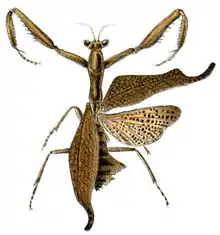Acanthops falcataria
Acanthops falcataria, common name South American dead leaf mantis, is a species of praying mantis in the family Acanthopidae. It is not to be confused with Acanthops falcata, a different species in the same genus that is often referred to with the same common name.
| Acanthops falcataria | |
|---|---|
 | |
| Adult female Acanthops falcataria | |
| Scientific classification | |
| Kingdom: | Animalia |
| Phylum: | Arthropoda |
| Class: | Insecta |
| Order: | Mantodea |
| Family: | Acanthopidae |
| Genus: | Acanthops |
| Species: | A. falcataria |
| Binomial name | |
| Acanthops falcataria (Goeze, 1778) | |
| Synonyms | |
| |
A. falcataria is one of many mantis species from various genera that resemble a dead leaf. Acanthops species have an unusual degree of sexual dimorphism compared to other mantids. The flightless female resembles a curled dead leaf and weighs twice as much as the male. It has reduced wings that can be lifted to reveal brightly colored warning colors on the abdomen. The male flies well and has long functional wings that resemble a flat or rolled-up dead leaf at rest. When perched, males often assume a posture where the head, grasping legs and prothorax add to the camouflage by recreating the appearance of a dead leaf's shriveled petiole and stipules.[1][2][3][4]
It is native to South America.
References
- "Archived copy". Archived from the original on 2011-06-06. Retrieved 2008-07-18.CS1 maint: archived copy as title (link) Tree of Life Web Project. 2005
- Texas A&M University
- "Archived copy". Archived from the original on 2010-04-14. Retrieved 2012-07-15.CS1 maint: archived copy as title (link) Bugs in Cyberspace
- Francesco Lombardo & Salvatrice Ippolito (2004). "Revision of the species of Acanthops Serville 1831 (Mantodea, Mantidae, Acanthopinae) with comments on their phylogeny". Annals of the Entomological Society of America. 97 (6): 1076–1102. doi:10.1603/0013-8746(2004)097[1076:ROTSOA]2.0.CO;2.